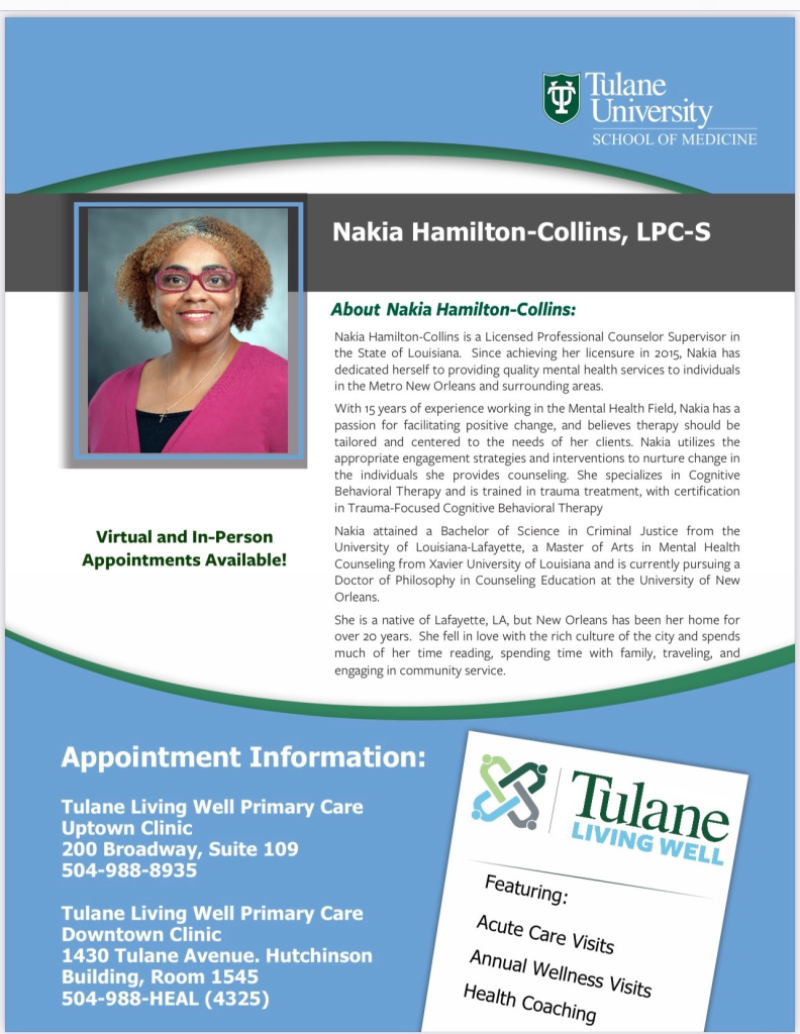Women’s Health
WOMEN'S HEALTH BLOG May 2023
A Mindful Reflection:
Finding Strength in the Midst of a Storm
Written by Nakia Hamilton-Collins, LPC-S
Before the COVID-19 pandemic, many women were able to develop self-care and coping strategies to address the day-to-day stressors that may have threatened their mental or emotional stability. Unfortunately, the pandemic created unforeseen challenges that society had never seen before. These challenges dramatically changed women’s lives and, undoubtedly, have profoundly affected women’s overall health. For example, the mandatory shutdown in and of itself produced widespread home confinement, massive job loss and unemployment, limited or reduced income, loss of income, limited to no social or physical interactions outside of the home, death of loved ones, and many other stressors. Moreover, these stressors may have led to isolation, hopelessness or helplessness, and the inability to cope with day-to-day functioning. In addition, many women did not have adequate support systems when dealing with their stressors. These stressors may have caused women to develop unhealthy coping habits such as overeating, substance use, or repressing their feelings while still maintaining their roles as primary caregivers for their families.
Women who experience elevated risk factors should also be aware that engaging in self-care activities (exercising, meditation, mindfulness, and journaling) and having a circle of support (family, friends, and pets) can decrease symptoms of depression and anxiety. These self-help tools are simple strategies women can employ while repurposing their state of being, creating a space of positive reflection, growth, and transformation. In addition, routine self-care can effectively stimulate balance and purpose, decreasing hopelessness and fear.
Educating women on the risk factors associated with mental illness may encourage and increase early screening. Early identification and treatment of risk factors may decrease the need for intensive outpatient or in-patient services (Florence et al., 2020). Symptoms associated with depression and anxiety necessitated mental health treatment at alarming rates (Florence et al., 2020). Identifying triggers associated with anxiety and stress is an essential part of treatment. In addition, it is creating preventive/effective measures and advocating for effective outcomes. Education, screening, and access to services are part of an integrative awareness, prevention, and treatment approach. Education increases awareness of personal needs (Florence et al., 2020). Educating about and encouraging self-care can offer a layer of support for individuals with minor stressors that can be self-managed or self-regulated with minimal support.
The pandemic also changed access to mental health. The traditional in-person/office appointments gave way to telehealth/virtual appointments. As a result, many women sought therapy to help address their mental health and adjust to “pandemic life.” Telehealth has provided convenience and broader access to women who work, have families, or live in areas without mental health services. In addition, employers have recognized the need to expand employee assistance programs and provide increased therapy sessions.
Access to therapeutic services (counseling, medical assessment, and medications) is integral to treating mental illness. The lack of these services may lead to severe symptoms and increased hospitalizations. The key is for mental health services to be accessible, convenient, and consistent. Accessing services may help women reintegrate into the workforce or career change, lose weight gained during the pandemic, adjust to new routines, readjust finances during an inflation crisis, and even learn to cope with the new phenomenon long COVID. Post-pandemic research has revealed increased anxiety and depression in mental health screening among women (Florence et al., 2020).
In the spirit of recognizing May as National Mental Health Awareness Month, let us be purposeful in recharging efforts to increase awareness and the importance of promoting mental health treatment for achieving positive outcomes for women’s overall well-being.
Reference: Florence, T. & Van Wijngaarden-Cremers, P. (2020). Women’s Mental Health in the Time of Covid-19 Pandemic. Frontiers in Global Women’s Health (1).


